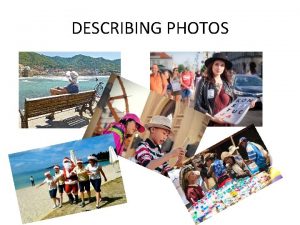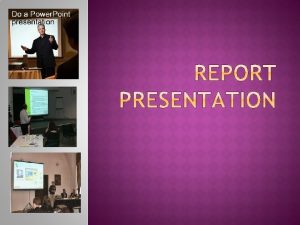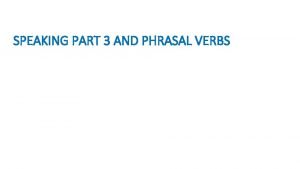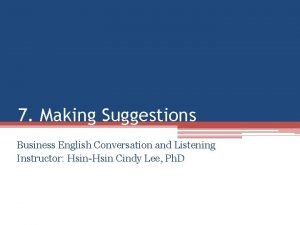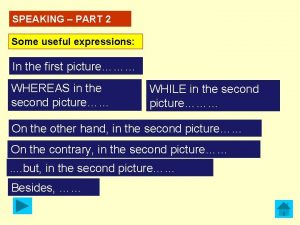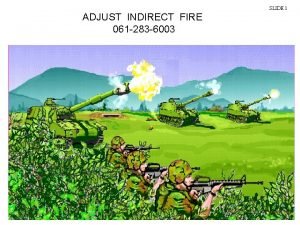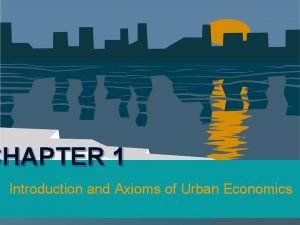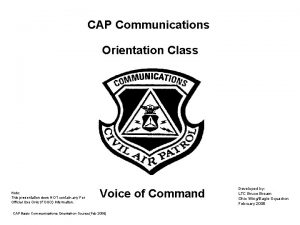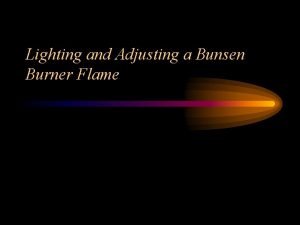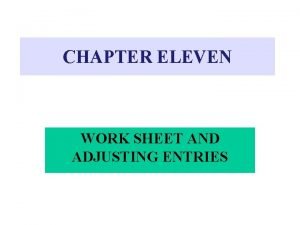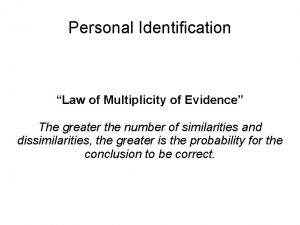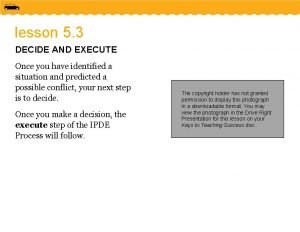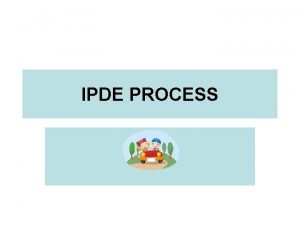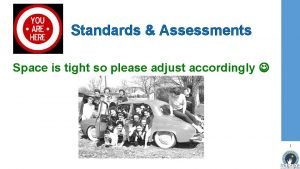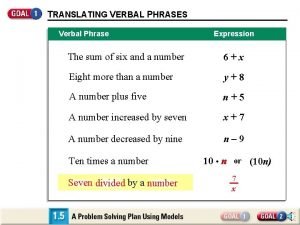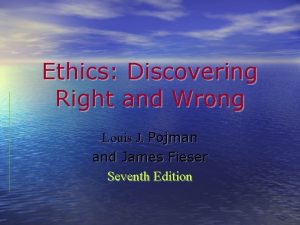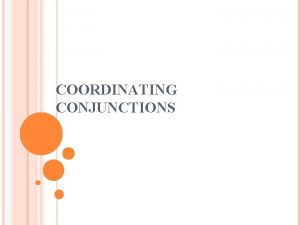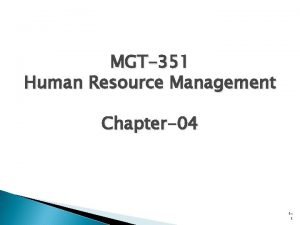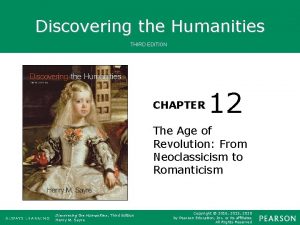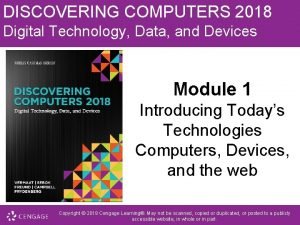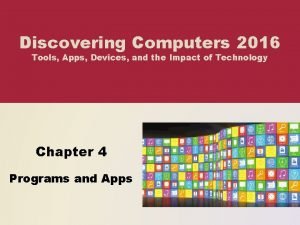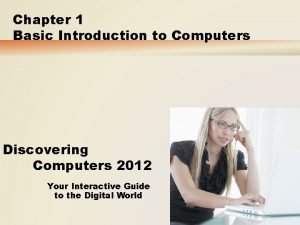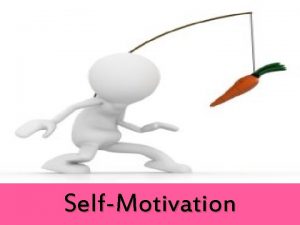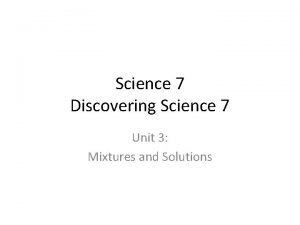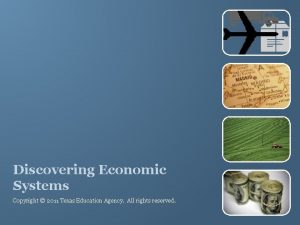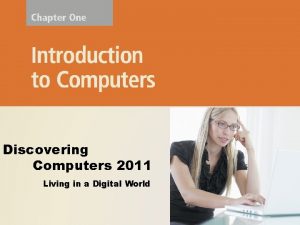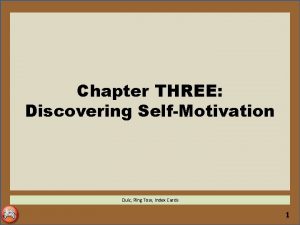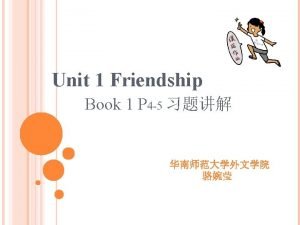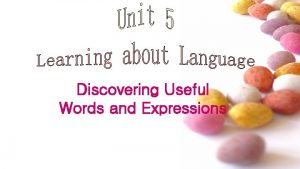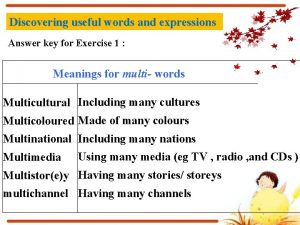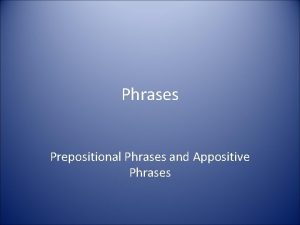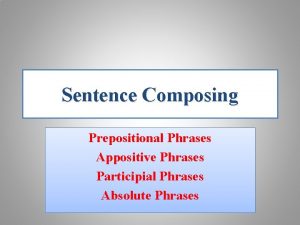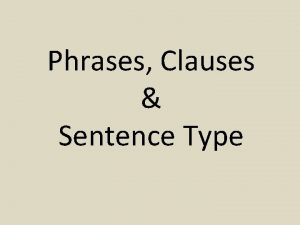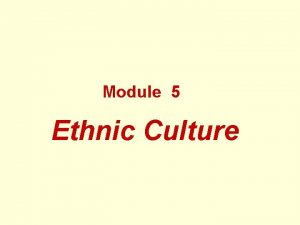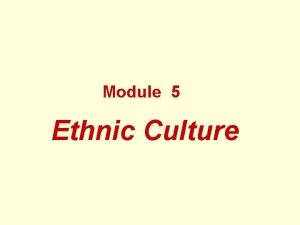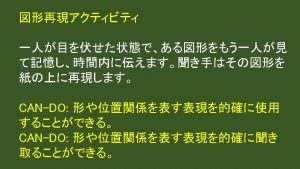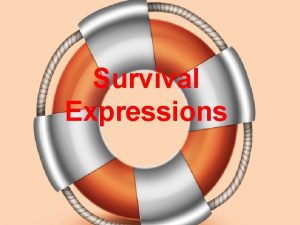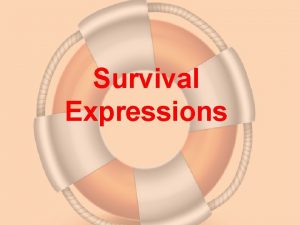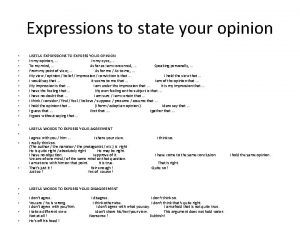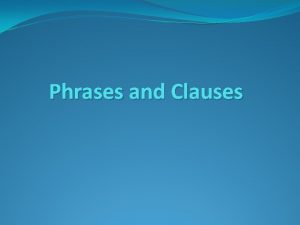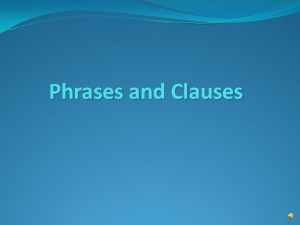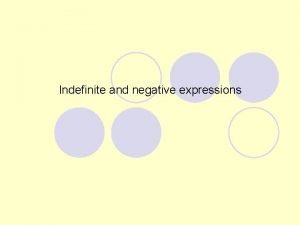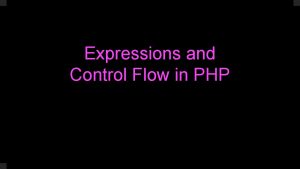Discovering useful words and expressions Words phrases adjust






























- Slides: 30

Discovering useful words and expressions

Words & phrases adjust purchase sew participate operate donate relevant soft political remote privilege 调整; 使合适 购买 缝制 参加 作; 运转 捐赠 有关的 软的 政治的 偏僻的 特权 hear from 接到…的信 be dying to 渴望; 极想 come across 碰到 stick out 伸出 dry up 干透 in need 在困难中 participate in 参加

1. Find words in the unit that have the following meanings. 1. to change slightly to make adjust something work better 2. a metal shelf for cooking meat, grill toasting bread, etc 3. connected with what is being done relevant or discussed concept 4. an idea 5. an honour privilege 6. something that has been organized arrangement 7. written work in an office, such as paperwork writing reports or letters 8. to breathe air into your nose sniff noisily

2. Complete the paragraph with the words or phrases below in their proper forms. otherwise airmail be dying to adjust muddy hear from fortnight platform remote Sharon looked at herself in the mirror and sighed. She airmail had posted the ______ letter to Tim last week but had no reply. She smoothed her hair down with a muddy wet comb, wiped her ______ shoes, and thought about the three months she had known him. He was the otherwise nicest boy she had ever met, _______

otherwise airmail be dying to adjust muddy hear from fortnight platform remote she would not have fallen in love with him. She still adjusted quickly when he heard remembered that he ______ remote she came from a _____ village. At first she had heard from him every week but now she had not heard ______ fortnight. Why? She had decided to find out. for a ______ platform to catch the train to New She walked down the _____ dying to York feeling both excited and nervous. She was ______ see him again but what if he didn't want to see her?

Answer key for Exercise 3: 1. dry out/up (干透/干涸) 2. dry off (弄干) 3. dry up (枯竭) 4. hear out(听完) 5. hear from 6. hear of 7. be dying to/for 8. die out 9. die down

Listening

Do you know anything about Turn to Page 35, read Exercises 1 and 2 MSF? About MSF: The MSF role in emergency medical aid Médecins Sans Frontières (MSF) is an international humanitarian aid organization that provides emergency medical assistance to populations in danger in more than 70 countries.





Task 1 Ex 1, P 35 The listening has many examples of phrases that express time sequence. Listen to these expressions and number them in the order you hear them.

4 in the future 1 during the 1980 s 2 for a couple of months 3 over the last few years 6 for a further six months 5 in two week’s time

Task 2 Listen again and make notes. Time Place Events studied medicine. Got to know 1980 s Sydney two Africa students 1992 Visited her two African friends Africa and their families. Worked in their local health clinic for a couple of months. Volunteered with MSF. Worked 1997 Malawi with children affected by HIV/AIDS.

Time Place 2001 Now The future The Sudan Events Conditions were very challenging because of the heat, the rains, the basic conditions in the clinics. Australia Has returned for two weeks Will return to the Sudan for six more months. After that, will probably return to Africa again.

Task 3 With a partner, answer the questions below before you listen for a third time. As you listen check your answer.

1. Why did Mary decide to work in developing countries? 2. Because when she worked in an African health clinic, she saw children with illnesses that could be prevented ______. 2. When Mary worked in a clinic in Malawi, why did the children die? 3. Because the clinics didn’t have enough medicines _________.

3. In Sudan, why was it nearly impossible for Mary to get to the clinics when the rains came? muddy Because the roads became so _____ that they spent most of their time digging the car out. __________

4. Why were conditions in the clinics in the Sudan challenging? hot it could Because it could be very ____; be nearly impossible to get to the clinics when it ______; rained the clinics were very basic and the only tools she had stethoscope and _____ her hands. were a ______

5. Why does Mary enjoy her job? She feels she is helping people who may not get help. otherwise ________

LISTENING TEXT MEDECINS SANS FRONTIERES J: Good morning. I’m Jennifer Wells and today on “Making a difference”, I’m going to talk to Dr Mary Murray who works for Medicines Sans Frontieres. Welcome, Mary.

M: Thank you, Jennifer. J: Now tell me why you decided to join MSF? M: Well, while I was studying in Sydney during the 1980 s, I got to know two Sudaness students and visited them in 1990. I became good friends with their families and decided to

work in a health clinic in their country in 1992 for a couple of months. There I saw children with terrible diseases that could have been prevented. That’s why I decided to work in developing countries.

J: I see. So in 1997 you joined MSF and went to Malawi. What did you do there? M: Actually in Malawi, I was working with children affected by HIV/AIDS. It was heart-breaking. Children died because we didn’t have enough medicines.

J: Oh, how sad! M: Yes, but things gradually improved. Now there’s treatment for HIV, which is showing very good results. J: That’s excellent news. Then, in 2001, you went to the Sudan again. Let’s talk about your work there.

M: Well, the conditions were rather challenging. It could be unbelievably hot—sometimes as hot as 56 degrees Celsius! But when the rains came, the roads became so muddy that we spent most of our time digging the car out. The clinics were just mud huts and the only tools I had were a stethoscope听诊 器 and my two hands.

J: Goodness, a challenge indeed! M: (laughing) True, but it’s amazing what you can do when you have no choice. J: And how do you think three experiences over the last few years have affected you?

M: Well, they make me grateful for what I have. I really enjoy my work because I feel I’m helping people who otherwise might not get help. J: That’s great. Now, just before you go… what do you expect to be doing in the future.

M: Well, I’m returning to the Sudan in two weeks’ time for a further six months. Then I’m not sure. I hope to return to Africa again though. J: Thank you, Dr Murray, and it’s been lovely talking to you. We wish you all the best with your work. M: Thank you, Jennifer.
 Site:slidetodoc.com
Site:slidetodoc.com Pictures of pairs
Pictures of pairs Useful phrases for presentations
Useful phrases for presentations Ladies and gentlemen, boys and girls
Ladies and gentlemen, boys and girls Speaking part 3 fce useful phrases
Speaking part 3 fce useful phrases Making suggestions phrases
Making suggestions phrases Useful expressions for speaking
Useful expressions for speaking Call for fire script
Call for fire script The five axioms of urban economics
The five axioms of urban economics Call sign examples
Call sign examples Bunsen burner striker
Bunsen burner striker Adjusting entries merchandise inventory
Adjusting entries merchandise inventory Father of dactyloscopy
Father of dactyloscopy The most important actions you execute as a driver
The most important actions you execute as a driver Compromise space
Compromise space Please adjust accordingly
Please adjust accordingly Ryse son of rome screen adjust
Ryse son of rome screen adjust How to write a verbal model
How to write a verbal model Ethics discovering right and wrong
Ethics discovering right and wrong Hooking up words and phrases and clauses
Hooking up words and phrases and clauses Discovering unassigned duties
Discovering unassigned duties Monk by the sea analysis
Monk by the sea analysis Discovering computers 2018 chapter 1 ppt
Discovering computers 2018 chapter 1 ppt Discovering computers 2016
Discovering computers 2016 Discovering computers 2018 chapter 1
Discovering computers 2018 chapter 1 Self motivation define
Self motivation define Discovering science 7
Discovering science 7 P value in statistics
P value in statistics Discovering economic systems comparative worksheet answers
Discovering economic systems comparative worksheet answers Discovering computers 2011
Discovering computers 2011 In the formula v x e = motivation
In the formula v x e = motivation

